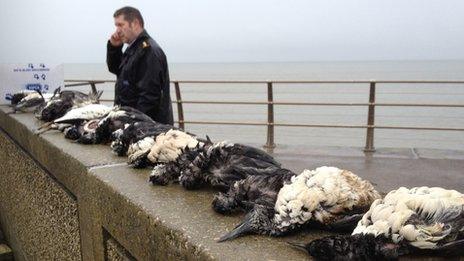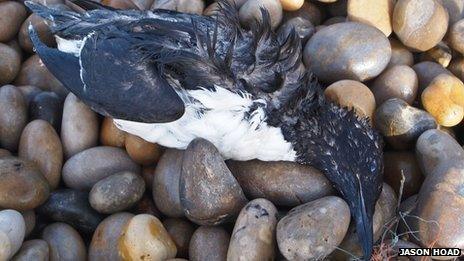'Refined mineral oils' blamed for bird contamination
- Published
Some of the birds have died while others have been taken to rescue centres
The substance found on hundreds of seabirds washed up on the south coast is a "mixture of refined mineral oils", the Environment Agency has said.
Wildlife experts have warned many more birds could be affected by the waxy substance found on washed up guillemots.
Hundreds of birds were found on beaches from Sussex to Cornwall on Thursday, many at Portland in Dorset.
The agency said the material was not vegetable, animal or palm oil.
Earlier, Environment Minister Richard Benyon said: "Every effort is being made to identify the cause of this problem."
'Rare occurrence'
He added: "I'd like to thank everyone involved in helping the seabirds affected and it's thanks to their efforts that many have been cleaned up and now have a chance of survival."
Several birds have died, but BBC wildlife presenter Chris Packham warned that could be the "tip of the iceberg".
"What's particularly frightening is that if you're picking up a hundred on the beach, there could be very many more which have died and been lost at sea," he said.
A coastguard plane has been dispatched to search the coast between Dover and the Isles of Scilly for any trace of the substance.
A Maritime and Coastguard Agency spokesman said: "This occurrence of seabirds being washed up on south coast beaches contaminated with a product is rare.
"We have received no specific reports of pollution within the English Channel area, but we have sent one of our counter pollution surveillance aircraft to investigate the sea areas between Dover and the Isles of Scilly."
Dr Simon Boxall, of the National Oceanography Centre at the University of Southampton, said earlier he thought the substance may have been dumped into the English Channel by a ship.
He said: "It sounds like - and it's pure speculation - that there's a ship out there somewhere that's flushed its tanks out illegally because it was being either too lazy or couldn't be bothered to pay the fees of having the tanks flushed in a port in the correct way."
Most birds have been found in Dorset but others are appearing in Sussex, Hampshire, Devon and Cornwall.

Some of the dead birds at Chesil Cove
The RSPCA said it had rescued more than 100 birds, which had been taken to the West Hatch Animal Centre in Taunton.
Wildlife officers said the rescued birds did "not respond well" to the cleaning techniques normally used to remove oil.
It has now begun using other products, such as vegetable oil and margarine, to clean the birds with some success.

Most of the dead birds were found on beaches around Portland
- Published31 January 2013
- Published31 January 2013
- Published19 July 2011